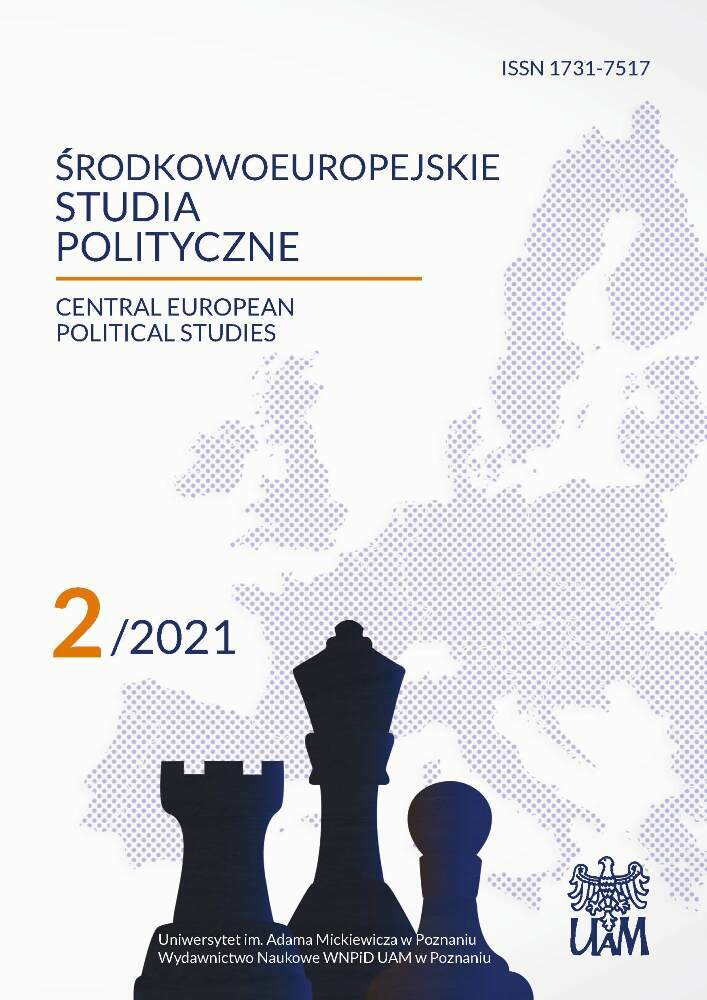Abstract
The political instrumentalization of the history of Ukraine carried out by the Russian Federation in the framework of the information war against Ukraine is covered in this article. This instrumentalization is exercised through media communication employing historical and political myths and narratives to vindicate Russia’s aggressive actions. The latest information and communication technologies used by the Kremlin in the information war against Ukraine have been identified in this paper. Such destructive efforts often derail Ukrainian-Polish relations, which are particularly sensitive to historical and political issues. The reasons for the drawbacks of the Ukrainian authorities in counteracting the information aggression on the part of the Russian Federation are distinguished, and the measures that would contribute to an effective response to such aggression are outlined.
References
Aaltola M. (2021), “Democratic Vulnerability and Autocratic Meddling: The Thucydidean Brink”, https://www.ncbi.nlm.nih.gov/pmc/articles/PMC7981554/.
Babka V. (2016), “Historical memory as a factor of political influence in independent Ukraine”, Thesis for Cand. Sc. (Political culture and ideology), 23.00.03 – Nizhyn Gogol State University, 244 p.
Baluk W. (2020), Polska na celowniku Putina. Narracja rosyjskiej propagandy w sprawie wybuchu II wojny światowej, https://phavi.umcs.pl/at/attachments/2020/0907/112151-biuletyn-politologiavissn.pdf, 24.02.2021.
Bondarenko I. (2019), Information component of the hybrid war of the Russian Federation against Ukraine, “Actual problems of information security management of the state”, pp. 13–15.
Damian A., Subernitchi V. (2020), Conspiracy theories and pro-Russian propaganda in EaP countries. Driving factors and potential beneficiaries, “CRPE Policy Brief”, https://www.crpe.ro/en/conspiracy-theories-and-pro-russian-propaganda-in-eap-countries-driving-factors-and-potential-beneficiaries/, 24.02.2021.
Danylenko S. (2020), Koncentracja prorosyjskich zasobów medialnych jako strategii niszczącego wpływu informacji na Ukrainę, https://phavi.umcs.pl/at/attachments/2020/0907/112151-biuletyn-politologiavissn.pdf (In Ukrainian), 24.02.2021.
Danylenko S. (2015), Mental, cultural and political consequences of Russia’s information aggression against Ukraine and ways to overcome it, “Problems of international relations”, issue no. 10–11, pp. 303–315 (In Russian).
Detector Media (2020), Ukrainian media spread Kremlin narratives about Ukraine as a “non-state”, “Nazi state” and its “external management” – monitoring, https://detector.media/infospace/article/181371/2020-10-08-ukrainski-media-poshyryuyut-kremlivski-naratyvy-pro-ukrainu-yak-nedoderzhavu-natsystsku-derzhavu-ta-zovnishnie-upravlinnya-neyu-monitoryng (In Ukrainian).
Galus A. (2019), Digital media in a contemporary conflict – example of Ukraine, “Środkowoeuropejskie Studia Polityczne”, issue no. 4, pp. 27–46.
Hrytsak Y., Galushko K., Primachenko Y. et al. (2019), Revision of History. Russian historical propaganda and Ukraine, http://resource.history.org.ua/item/0014736 (In Ukrainian), 24.02.2021.
Kasyanov G. (2014), Historical policy of the 1990s – early XXI century: Ukraine and the post-Soviet space, “Modern Ukraine”, issue no. 21, pp. 135–159.
Kofman M. (2017), Lessons from Russia’s Operations in Crimea and Eastern Ukraine, RAND Corporation, 128 p., https://www.rand.org/content/dam/rand/pubs/research_reports/RR1400/RR1498/RAND_RR1498.pdf.
Lucas E., Pomerantsev P. (2016), The purpose of Russian propaganda – to sow despair and paranoia. How to counteract, https://texty.org.ua/articles/70089/Meta_rosijskoji_propagandy__posijaty_zneviru_i-70089/ (In Ukrainian), 24.02.2021.
Meduza (2020), “Letter of the Belgian doctors” – a fundamental manifesto of covid deniers, https://meduza.io/feature/2020/10/19/pismo-belgiyskih-vrachey-fundamentalnyy-manifest-kovid-otritsateley-my-izuchili-istoriyu-ego-poyavleniya-i-razobrali-glavnye-argumenty (In Russian), 24.02.2021.
Miller A. (2020), “Russia and Europe in memory wars”, NUPI Working Paper 887, Norwegian Institute of International Affairs, 20 p.
Olkhovskii J. (2020), Infodemia – dezinformacja w czasach zarazy, https://phavi.umcs.pl/at/attachments/2020/0907/112151-biuletyn-politologiavissn.pdf.
Olkhovskii J. (2019), Polish-Ukrainian relations in the policy of (dis)information of the Russian Federation, “Ukrainian-Polish relations in terms of hybrid security threats”, pp. 216–231 (In Ukrainian), 24.02.2021.
Shevchuk P. (2014), Information and psychological war of Russia against Ukraine: how to counter it, http://nbuv.gov.ua/UJRN/DeVr_2014_13_11 (In Ukrainian), 24.02.2021.
Skuczynski M. (2016), Interesy narodowe Federacji Rosyjskiej w Syrii na tle rosyjskiej interwencji w 2015 roku, http://studiastrategiczne.amu.edu.pl/wp-content/uploads/2016/11/10.pdf, 24.02.2021.
Smagliy K. (2018), Hybrid analytica: pro-Kremlin expert propaganda in Moscow, Europe and the U.S. A case study on think tanks and universities, https://static1.squarespace.com/static/59f8f41ef14aa13b95239af0/t/5c6d8b38b208fc7087fd2b2a/1550682943143/Smagliy_Hybrid-Analytica_10-2018_upd.pdf, 24.02.2021.
SNIP (2017), Ukrainian “Breeze” from the Crimea: 23 years on the air, http://snip.net.ua/20171122/ukrayinskyj-bryz-iz-krymu-23-roky-v-efiri/ (In Ukrainian), 24.02.2021.
Stadnyk A. (2016), Information war as a communicative technology of influence on mass consciousness and public opinion, “Grani. Sociology”, issue no. 1, pp. 111–115 (In Ukrainian).
Sweet J. (2016), Political Invasions into Collective Memories: Russia, “International Journal of Communication”, https://ijoc.org/index.php/ijoc/article/viewFile/4406/1781.
Yablonsky V., Valevsky O., Zdioruk S. et al. (2019), The policy of historical memory in the context of national security of Ukraine: an analytical report, https://niss.gov.ua/sites/default/files/2019-09/dopovid_polityka_druk_03.pdf (In Ukrainian), 24.02.2021.
License
Copyright (c) 2021 Serhiy Danylenko, Olena Shcherbatiuk

This work is licensed under a Creative Commons Attribution 4.0 International License.

